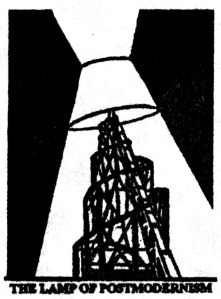S. E. Armstrong,
The Lamp of Postmodernism, rubber stamp print on paper, 4.5″ x 6″, 1999
S. E. Armstrong was born in Toronto, Canada in 1951 and lived there until moving to Belleville, Ontario in 1986. He has a Bachelor of Arts in Philosophy from the University of Toronto and is a graduate of the Ontario College of Art, now OCAD University, in Toronto. He studied with Royden Rabinowitch, Murray Favro, Greg Curnoe, Ron Martin and Gary Dault. Armstrong has exhibited regularly in commercial, parallel, co-op and public galleries in Canada and the United States since 1977. He edits and publishes a journal of artists’ projects called Wegway Primary Culture which is hibernating at the moment but will awaken soon in both paper and electronic versions. His writing has been published in Canadian art magazines such as Espace and Lola.
Armstrong has had an abiding interest the Russian avant-garde and dada since adolescence, and he remains especially fond of Alexander Rodchenko, Vladimir Tatlin, Hannah Höch, and Kurt Schwitters. He believes there are still some loose ends to be considered in the work of the American Action painters (Harold Rosenberg), also called Abstract Expressionists (Clement Greenberg) – Pollock and Still in particular. These loose ends have nothing to do with either Expressionism or Formalism and may also have very little to do with Pollock and Still’s opinions about their own work, “What you see is what you see,” as Frank Stella pointed out. Armstrong’s friend since the 1970’s, John Scott, thinks Armstrong’s a Modernist, but Armstrong strongly disagrees. He also forgives John for considering such a thing.
Armstrong thinks Arthur Cravan’s writing is very charming and funny; Tristan Tzara‘s prose is better poetry than anything Ezra Pound produced; Edgar Varèse‘s music is perfectly moving; and he has the deepest respect for Ad Reinhardt’s ethics. This last point helps explain his fierce opinion that Braque is a superb painter and Picasso is a thief and a charlatan. And all of the above helps explain John Scott’s opinion. It was T. S. Eliot’s opinion that we have to embrace our tradition, whatever it may be, before we can move forward. Armstrong thinks radical is about roots.
Wm. F. Krendall, Wegway’s mysterious advisor.
I suggest you check out @tlas press for some interesting tradition.


tonguesandwiches@gmail.com
LikeLike
Tongue Sandwich exposed as plagiarist: http://emcybulska.blogspot.co.uk/
LikeLike
Please see part II: http://emcybulska.blogspot.co.uk/
LikeLike
And this is what the Super-plagiarist ‘Tongue Sandwich’ had to say: “Mar 31, 2013 – Posts about intellectual property written by Tongue Sandwich™ …Such blatant plagiarism of copying and pasting on the Internet is known as …”
Yet, he was the one who was plagiarising ‘up to his eye-balls’! He closed his ‘inventive’ blog in total shame only 48 hours after being exposed, stunned by his very own Medusa
LikeLike
こんにちは。僕は今日で37歳と1か月になります。そして夏日が多い日になりました。ですからやっぱりムダ毛は除毛をやっておきたいですよね。今では、全国に医療クリニックがたくさんあります。やりたいところは、人それぞれですが、特に人気なのはフェイスです。私は、全身脱毛の脱毛ラボに通っています。そのおかげで、今はムダ毛が減ってきました!やはり一人で処理するのとは、違います。あとちょっと脱毛ラボに脱毛しにいってムダ毛を減らしたいです。でも、医療クリニックに通ったとしても知っておきたいのは脱毛にかかる料金です。それについては、先生に聞けばいいでしょう。あと気になるのが、長い間通わないといけないのかです。私はできれば、9カ月くらいで全部終わってくれると助かりますね。まあ、脱毛ラボに行きたい人は相談してみましょう。
LikeLike